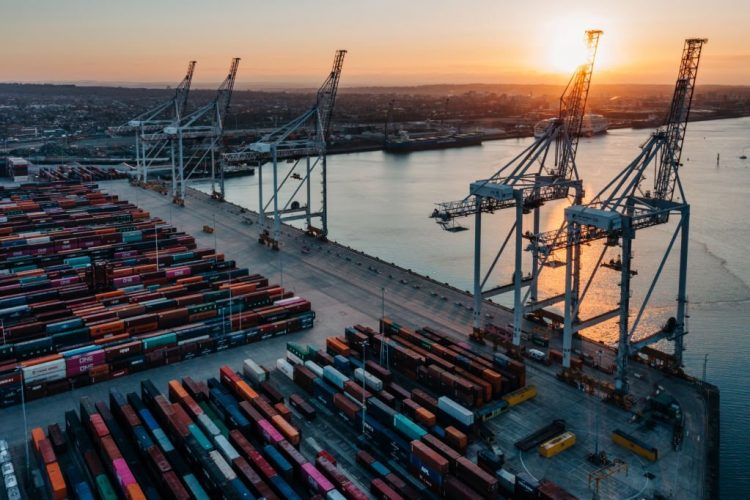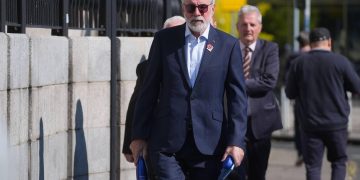- Where did the Irish Protocol end up?
- Will the new prime minister improve relations with the European Union?
- What are the expectations of both sides from each other?
Boris Johnson’s election as leader of the Conservative Party ensured the latter outcome. This in turn raised the thorny issue of the so-called the Northern Ireland protocol bill. Simply put, absent something approximating Single Market and Customs Union membership (negotiated by Theresa May in the form of her infamous ‘backstop’), the choice was between a border on the island of Ireland (rejected by both the UK and the EU) and some kind of special status for Northern Ireland that obviated the need for intra-Irish checks, consequently requiring them between Great Britain and Northern Ireland.
It has been a long and bumpy road from the referendum of 23 June 2016 to where we are today
The resignation of Boris Johnson is not seen as a harbinger that the UK will soon seek a more mutually beneficial approach to EU-UK relations, much to the disappointment of those in Brussels who have grown tired of the constant confrontation over the last few years.
“Indeed there was a bit of glee, maybe schadenfreude to see Johnson go, but in the end, we are all very well versed in politics in Britain at this stage and understand we won’t likely get a reasonable voice,” said a diplomat.
Even before becoming prime minister, Truss had already set the British government on a collision course with the EU
The indications are that once in Downing Street, the impact won’t be long in coming. Launching her leadership campaign, she listed the Northern Ireland Protocol Bill — “in the face of EU intransigence” — among several personal achievements in government.
Now going through parliament, it paves the way for British ministers to rip up part of the Brexit divorce deal covering the UK territory. “This could prompt a trade war and would worsen already strained UK-EU relations,” Anand Menon, Director of the think-tank UK in a Changing Europe, wrote in a paper examining the Conservative leadership candidates’ policies.
The UK has until 15 September to respond to EU legal action taken over the UK’s failure to fully implement Northern Ireland border checks under the Protocol. According to the Financial Times, Truss is considering triggering immediately the Protocol’s Article 16 — a supposed last resort clause enabling either side to take unilateral “safeguard” measures to overcome “serious” difficulties.
Truss’s allies describe such tactics as an “insurance policy”, stressing that she prefers a negotiated solution with Brussels. But Anand Menon argues that even if the Bill is withdrawn, “should the Government insist on a renegotiation of the Protocol it is hard to see how any agreement could be reached”.
Lord Peter Ricketts, a former UK ambassador to France and senior Foreign Office official, believes Truss’ dual approach — taking action to disapply the Protocol while seeking to negotiate with the EU — will backfire, and simply bring more retaliatory action.
Peter Ricketts added “We will get into a downward cycle of reaction from the EU at a time when we’ve got a major war in Europe, we’ve got the biggest cost of living crisis for a generation,” he told BBC Radio. “The government should pause this Northern Ireland Bill, because if it’s pushed through, it’s explosive with the Europeans.”
She has vowed to review all EU law still applicable in the UK by the end of 2023, promising in early August to “make it a priority to slash EU red tape” in the financial sector. New prime minister once said in a statement on pledge to ditch all EU laws by 2023, July 22, 2022″EU regulations hinder our businesses and this has to change… In Downing Street, I will seize the chance to diverge from outdated EU law and frameworks and capitalise on the opportunities we have ahead of us.” —.
“As prime minister, she (Truss) would likely be unwilling to compromise with Brussels, continuing the Johnson government’s pursuit of “perpetual Brexit” — regularly and deliberately sparking arguments with the EU to provide headlines for Europhobic newspapers,” Adam Harrison of the European Council on Foreign Relations (ECFR) predicted recently, based on Truss’ record as foreign secretary.
Brussels itself launched legal action against the UK over the one of the most controversial issues, Northern Ireland Protocol Bill.
Now, Ms Truss has written to the European Commission to launch her own dispute resolution proceedings in a bid to unblock access to the programmes, which the Government said was part of the Brexit trade deal signed by both sides in 2020.
As the British government launched a formal appeal against the UK’s exclusion from EU scientific programmes, including Horizon Europe. The former Foreign Secretary accused the EU and said: “The EU is in clear breach of our agreement, repeatedly seeking to politicise vital scientific cooperation by refusing to finalise access to these important programmes. We cannot allow this to continue.”
The relationship with the pro-European leader, Emmanuel Macron, is also not friendly.
Earlier this year, Liz Truss, who was the frontrunner in the Conservative party leadership contest, told a House of Commons committee that the UK’s focus was on Nato and the G7 rather than the body mooted by Macron. Last month Truss said the “jury’s out” when asked if Macron was a friend or foe. French President Emmanuel Macron also commented about current UK prime minister ”We are friends with Britain, but Liz Truss is ‘playing to the gallery”
There are still bright glimmers of possible future
Hopes that Brexit talks between the EU and the UK could restart after nine months of paralysis were raised over the weekend after Northern Ireland minister Conor Burns held talks with the European Commission vice-president Maroš Šefčovič.
He spoke as the Irish prime minister, Micheál Martin, said the deepening row over the Brexit arrangements for Northern Ireland was “testing and fraying” Anglo-Irish relations, but that the arrival of a new prime minister offered a chance for a fresh approach to break the impasse.
The EU is fully expecting Truss to press ahead with the Northern Ireland protocol bill
But British sources have pointed out that even if article 16 is triggered, which allows one side to in effect unilaterally suspend provisions in the Brexit deal, the legislation that will enable the government to rip up part of the protocol will not go to the House of Lords until mid-October at the earliest. This leaves a six-week window in which pre-talks could take place.
On Friday the Northern Ireland secretary, Shailesh Vara, indicated that there would be no pulling back and that the UK needed to have the legislation in place as an “insurance policy” and Truss is reportedly considering triggering article 16, which would signal no weakening of position to the Eurosceptic wing of the Tory party.
These problems between the UK and EU have obvious effects on the Briths.
A recent June report by the Centre for European Reform (CER) showed that the UK economy is 5 per cent smaller than if Britain had stayed in the EU. The same report estimated that investment is 13.7 per cent lower, and goods trade, is 13.6 per cent lower in the final quarter of 2021.





























